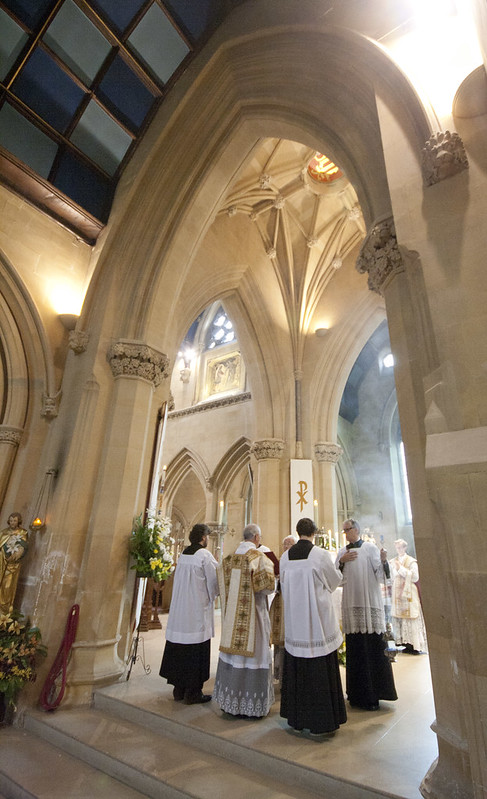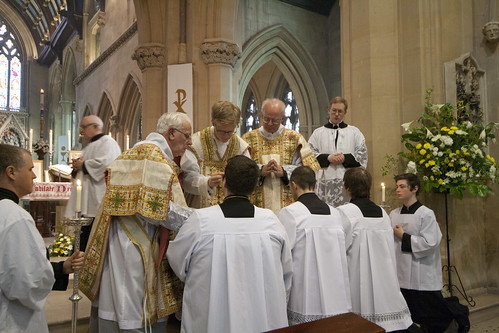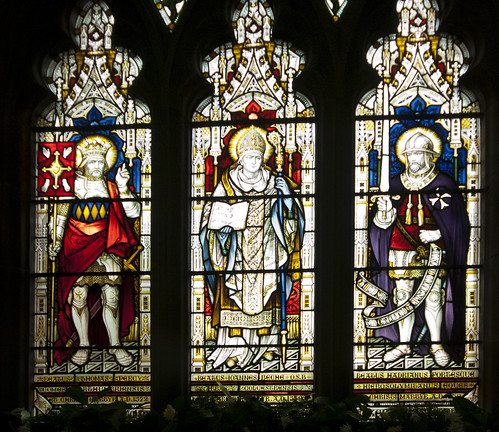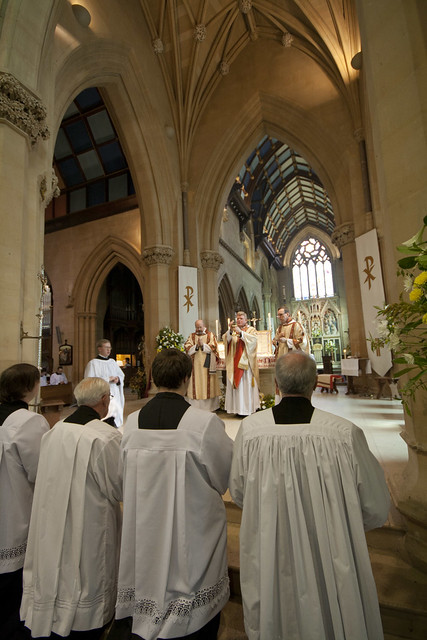
High Mass in the Extraordinary Form, at the LMS Priest Training Conference,
Belmont Abbey.
I explained in my last post the sorts of things even quite conservative bishops, religious superiors, and curial officials might say to explain why grass-roots conservative activism worries them, even as they cheerfully tolerate the likes of Basil Loftus and Tina Beattie. It rocks the boat. It makes - as the Holy Father might say - a mess. It complicates their careful plans. And, looking at the situation strategically, they may think that it is more important to seek after the lost sheep of liberal dissent, than the 99 sheep in the fold of orthodoxy. Especially as the dissidents seem to represent the wider culture - by being nice to them, they are opening the door to everyone outside the Church.
I should say right away that I completely understand the fear of conservative bishops that groups of conservative activists will make prudential mistakes, strategic blunders, and even theological errors. The Holy Ghost does not prevent good people seeking good things from being counter-productive. But the position of these conservative hierarchs is itself based on a number of prudential misjudgments. Let me list some.
1. If we are nice to the dissidents, we have some hope of saving them for the Church. By which they mean: allow the dissidents to keep their positions of prestige and influence, and make them feel valued. This is a mistake because this treatment simply reinforces the idea that dissident views are the new orthodoxy, both for the dissidents themselves, and for those who see them treated in this way.
2. If we sideline conservatives, they will at any rate stay in the Church and continue to support us. Wrong: Catholics who might be described as naturally conservative have joined the SSPX, become sede vacantists, or joined Evangelical Protestant churches; they have lapsed, they've taken to drink, and clerics have abandoned their vocations; in a talk of Michael Davies he mentions one he knew driven to suicide. They are deserving of pastoral concern just as much as other folk.
3. We can solve the problems behind the scenes more easily if conservative activists aren't making a fuss in public. This may sometimes be true, but it is hard to see how it could be in very many instances. If there is no fuss, then it is assumed there is no scandal. If there is no scandal, then it is assumed there is no problem. We can all think of examples of serious problems, well known to apparently conservative bishops, which were never publicised and - what do you know? - never addressed, sometimes for decades. The sex abuse scandals, of course, exemplify this.
4. These activists are out of control and poorly led. Sometimes: but if the conservatives in authority went to even a little trouble, they could gain the trust of the most important activists and exercise some guidance over them. This does indeed happen sometimes, but only when the bishops or officials throw off the attitude that error should not be publicly opposed, because without that they are not going to gain the trust of anyone.
5. Unity is more important than the purity of our orthodoxy. What those who say this actually mean is that any Catholics who still have the Faith should stop opposing attempts to teach a pack of lies to Catholic school children, trainee teachers, seminarians, and the Faithful. That may make for a quiet life, but it doesn't make for the unity for which Our Lord prayed.
6. By avoiding conflict, we keep doors open for dialogue. In practice, it is easier to have dialogue when people aren't pretending that they and others don't have the differences of opinion that they have. Basil Loftus sends out smoke signals that he's in favour of women priests: how can you have a meaningful discussion on that basis? If I pretended not to notice the smoke signals, the question of dialogue wouldn't even arise.
7. Evangalisation is about not scaring liberal non-Catholics away by talking about hard doctrines. I've addressed this before. To reiterate, evangelisation is, on the contrary, about offering something distinctive which non-Catholics don't already have.
The underlying misjudgment, in my view, is a failure to understand how much damage dissent does. The Faith is passed on, the life of grace is developed, nearly always in the context of institutions: the home, the school, the parish. This is logical because Catholic institutions manifest the community of the Church, the Mystical Body of Christ, in a tangible way, to us as individuals. These institutions can be turned into a nightmare of conflict, or just rendered completely useless, by a minority of dissidents, if they are given a free hand. I have in mind things like a few teachers who mock the Faith in the classroom, or parish busybodies who show no respect for the Blessed Sacrament. If they are left to get on with it, no one in the institution can take seriously the Catholic claims of those nominally in charge. It can no longer inculcate a Catholic culture, a Catholic perspective on the world, because it no longer manifests one. In a very short time, it is no longer a Catholic institution, though it may remain one where some Catholics work, or where some sacraments take place, which can have an effect on individuals as individuals. To repeat, this is not the unity for which Our Lord prayed.
In the destruction of these local, tangible institutions, as manifestations of the Mystical Body and as channels of grace, we see the destruction of the Catholic community. Those who have authority over these institutions have the obligation to exercise it for the common good - not just for the good, as they see it, of a few dissident intellectuals. Generally speaking, over the last half a century, they have not exercised this authority. When conservative activists talk about this, the get the sort of welcome which was extended to Elijah and Jeremiah.
This may start changing, but it is going to be very slow. Personally I admire these conservative activists, and I have made my own contribution to this work, such as in my posts on Mgr Loftus. I also acknowledge their limitations and mistakes - and my own, in this department. What I would say to them, and to their supporters, is that as well as criticising dissent, we need to start building things up from the grass roots in a positive way. I personally think that this has got to include a recovery of the ancient liturgy.
This is why tomorrow I will post about the Latin Mass Society's Priest Training Conference in Belmont Abbey, and from now until September my life is going to be dominated by a succession of devotional and educational events involving the traditional Mass. My readers may be less interested in these than they are about the latest episode of ecclesiastical politics, but, sub specie aeternitatis, from the perspective of eternity, these events may have more effect on the future of the Church. And they will, at any rate, keep me sane.


